Leadership and Followership: Reflective Project on Everest Simulation
VerifiedAdded on 2023/06/04
|8
|2484
|366
AI Summary
This reflective project explores leadership and followership through the lens of an Everest simulation. It includes reflections on leadership experiences, the impact of different personalities and cultures within the simulated team, and an analysis of encountered leadership and followership styles. The project delves into the application of leadership theories, specifically transformational leadership, and identifies areas for personal development as a leader. The author reflects on both positive and negative aspects of their leadership and followership roles, highlighting the importance of open communication and conflict resolution. A development plan is outlined, focusing on cultivating skills to become a more effective and open-minded transformational leader, with a timeline for achieving specific goals. Desklib offers this and other solved assignments to aid students in their studies.

Reflective PROJECT
Paraphrase This Document
Need a fresh take? Get an instant paraphrase of this document with our AI Paraphraser
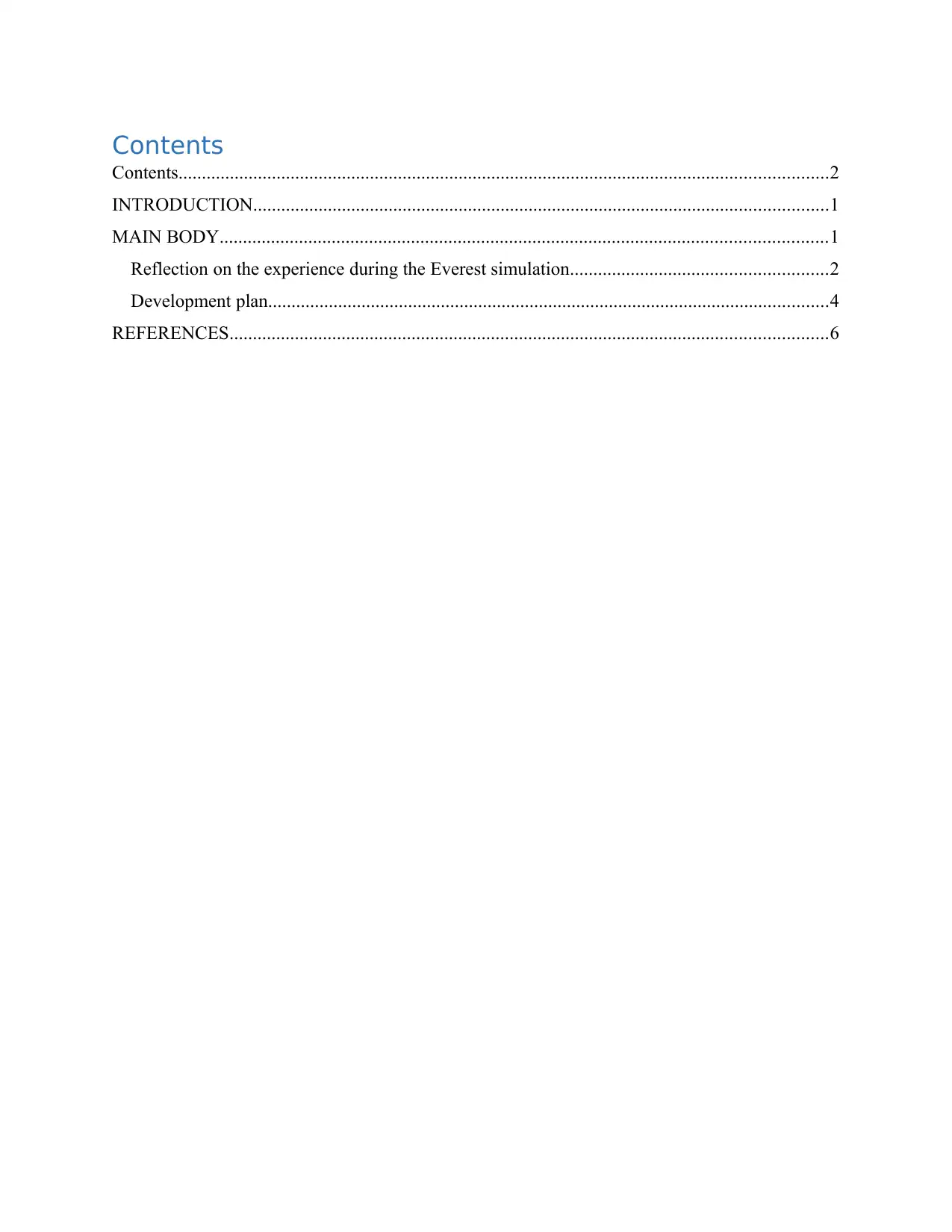
Contents
Contents...........................................................................................................................................2
INTRODUCTION...........................................................................................................................1
MAIN BODY..................................................................................................................................1
Reflection on the experience during the Everest simulation.......................................................2
Development plan........................................................................................................................4
REFERENCES................................................................................................................................6
Contents...........................................................................................................................................2
INTRODUCTION...........................................................................................................................1
MAIN BODY..................................................................................................................................1
Reflection on the experience during the Everest simulation.......................................................2
Development plan........................................................................................................................4
REFERENCES................................................................................................................................6
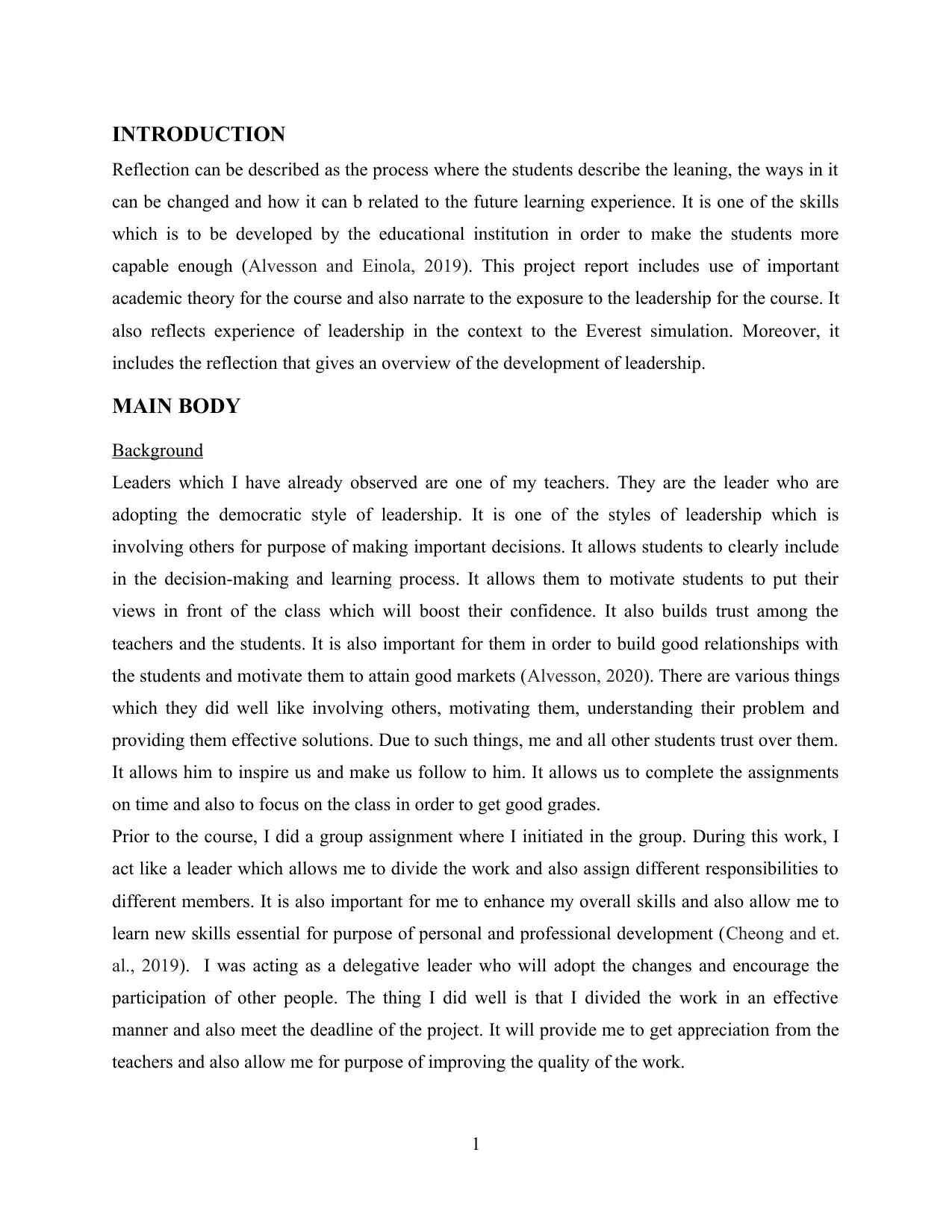
INTRODUCTION
Reflection can be described as the process where the students describe the leaning, the ways in it
can be changed and how it can b related to the future learning experience. It is one of the skills
which is to be developed by the educational institution in order to make the students more
capable enough (Alvesson and Einola, 2019). This project report includes use of important
academic theory for the course and also narrate to the exposure to the leadership for the course. It
also reflects experience of leadership in the context to the Everest simulation. Moreover, it
includes the reflection that gives an overview of the development of leadership.
MAIN BODY
Background
Leaders which I have already observed are one of my teachers. They are the leader who are
adopting the democratic style of leadership. It is one of the styles of leadership which is
involving others for purpose of making important decisions. It allows students to clearly include
in the decision-making and learning process. It allows them to motivate students to put their
views in front of the class which will boost their confidence. It also builds trust among the
teachers and the students. It is also important for them in order to build good relationships with
the students and motivate them to attain good markets (Alvesson, 2020). There are various things
which they did well like involving others, motivating them, understanding their problem and
providing them effective solutions. Due to such things, me and all other students trust over them.
It allows him to inspire us and make us follow to him. It allows us to complete the assignments
on time and also to focus on the class in order to get good grades.
Prior to the course, I did a group assignment where I initiated in the group. During this work, I
act like a leader which allows me to divide the work and also assign different responsibilities to
different members. It is also important for me to enhance my overall skills and also allow me to
learn new skills essential for purpose of personal and professional development (Cheong and et.
al., 2019). I was acting as a delegative leader who will adopt the changes and encourage the
participation of other people. The thing I did well is that I divided the work in an effective
manner and also meet the deadline of the project. It will provide me to get appreciation from the
teachers and also allow me for purpose of improving the quality of the work.
1
Reflection can be described as the process where the students describe the leaning, the ways in it
can be changed and how it can b related to the future learning experience. It is one of the skills
which is to be developed by the educational institution in order to make the students more
capable enough (Alvesson and Einola, 2019). This project report includes use of important
academic theory for the course and also narrate to the exposure to the leadership for the course. It
also reflects experience of leadership in the context to the Everest simulation. Moreover, it
includes the reflection that gives an overview of the development of leadership.
MAIN BODY
Background
Leaders which I have already observed are one of my teachers. They are the leader who are
adopting the democratic style of leadership. It is one of the styles of leadership which is
involving others for purpose of making important decisions. It allows students to clearly include
in the decision-making and learning process. It allows them to motivate students to put their
views in front of the class which will boost their confidence. It also builds trust among the
teachers and the students. It is also important for them in order to build good relationships with
the students and motivate them to attain good markets (Alvesson, 2020). There are various things
which they did well like involving others, motivating them, understanding their problem and
providing them effective solutions. Due to such things, me and all other students trust over them.
It allows him to inspire us and make us follow to him. It allows us to complete the assignments
on time and also to focus on the class in order to get good grades.
Prior to the course, I did a group assignment where I initiated in the group. During this work, I
act like a leader which allows me to divide the work and also assign different responsibilities to
different members. It is also important for me to enhance my overall skills and also allow me to
learn new skills essential for purpose of personal and professional development (Cheong and et.
al., 2019). I was acting as a delegative leader who will adopt the changes and encourage the
participation of other people. The thing I did well is that I divided the work in an effective
manner and also meet the deadline of the project. It will provide me to get appreciation from the
teachers and also allow me for purpose of improving the quality of the work.
1
⊘ This is a preview!⊘
Do you want full access?
Subscribe today to unlock all pages.

Trusted by 1+ million students worldwide
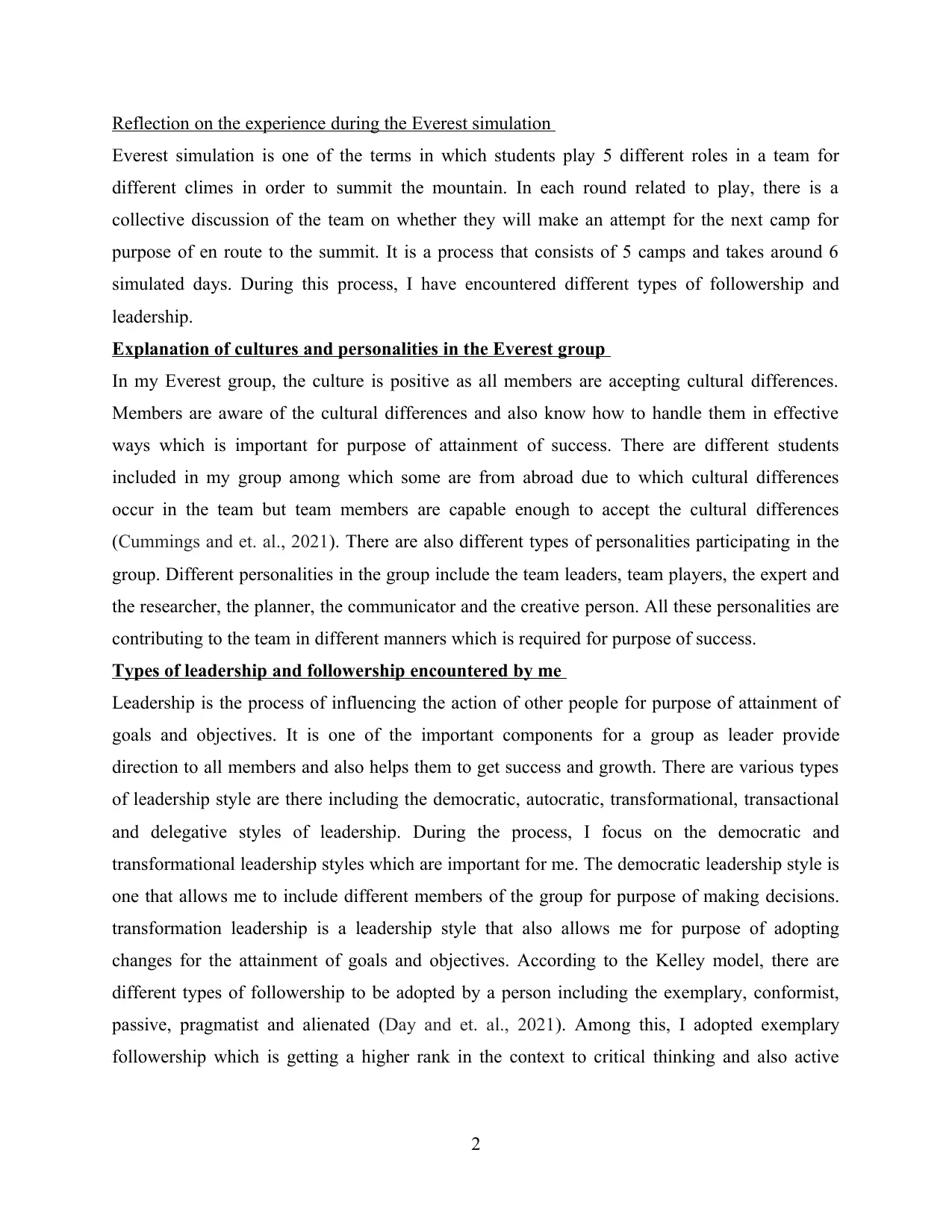
Reflection on the experience during the Everest simulation
Everest simulation is one of the terms in which students play 5 different roles in a team for
different climes in order to summit the mountain. In each round related to play, there is a
collective discussion of the team on whether they will make an attempt for the next camp for
purpose of en route to the summit. It is a process that consists of 5 camps and takes around 6
simulated days. During this process, I have encountered different types of followership and
leadership.
Explanation of cultures and personalities in the Everest group
In my Everest group, the culture is positive as all members are accepting cultural differences.
Members are aware of the cultural differences and also know how to handle them in effective
ways which is important for purpose of attainment of success. There are different students
included in my group among which some are from abroad due to which cultural differences
occur in the team but team members are capable enough to accept the cultural differences
(Cummings and et. al., 2021). There are also different types of personalities participating in the
group. Different personalities in the group include the team leaders, team players, the expert and
the researcher, the planner, the communicator and the creative person. All these personalities are
contributing to the team in different manners which is required for purpose of success.
Types of leadership and followership encountered by me
Leadership is the process of influencing the action of other people for purpose of attainment of
goals and objectives. It is one of the important components for a group as leader provide
direction to all members and also helps them to get success and growth. There are various types
of leadership style are there including the democratic, autocratic, transformational, transactional
and delegative styles of leadership. During the process, I focus on the democratic and
transformational leadership styles which are important for me. The democratic leadership style is
one that allows me to include different members of the group for purpose of making decisions.
transformation leadership is a leadership style that also allows me for purpose of adopting
changes for the attainment of goals and objectives. According to the Kelley model, there are
different types of followership to be adopted by a person including the exemplary, conformist,
passive, pragmatist and alienated (Day and et. al., 2021). Among this, I adopted exemplary
followership which is getting a higher rank in the context to critical thinking and also active
2
Everest simulation is one of the terms in which students play 5 different roles in a team for
different climes in order to summit the mountain. In each round related to play, there is a
collective discussion of the team on whether they will make an attempt for the next camp for
purpose of en route to the summit. It is a process that consists of 5 camps and takes around 6
simulated days. During this process, I have encountered different types of followership and
leadership.
Explanation of cultures and personalities in the Everest group
In my Everest group, the culture is positive as all members are accepting cultural differences.
Members are aware of the cultural differences and also know how to handle them in effective
ways which is important for purpose of attainment of success. There are different students
included in my group among which some are from abroad due to which cultural differences
occur in the team but team members are capable enough to accept the cultural differences
(Cummings and et. al., 2021). There are also different types of personalities participating in the
group. Different personalities in the group include the team leaders, team players, the expert and
the researcher, the planner, the communicator and the creative person. All these personalities are
contributing to the team in different manners which is required for purpose of success.
Types of leadership and followership encountered by me
Leadership is the process of influencing the action of other people for purpose of attainment of
goals and objectives. It is one of the important components for a group as leader provide
direction to all members and also helps them to get success and growth. There are various types
of leadership style are there including the democratic, autocratic, transformational, transactional
and delegative styles of leadership. During the process, I focus on the democratic and
transformational leadership styles which are important for me. The democratic leadership style is
one that allows me to include different members of the group for purpose of making decisions.
transformation leadership is a leadership style that also allows me for purpose of adopting
changes for the attainment of goals and objectives. According to the Kelley model, there are
different types of followership to be adopted by a person including the exemplary, conformist,
passive, pragmatist and alienated (Day and et. al., 2021). Among this, I adopted exemplary
followership which is getting a higher rank in the context to critical thinking and also active
2
Paraphrase This Document
Need a fresh take? Get an instant paraphrase of this document with our AI Paraphraser
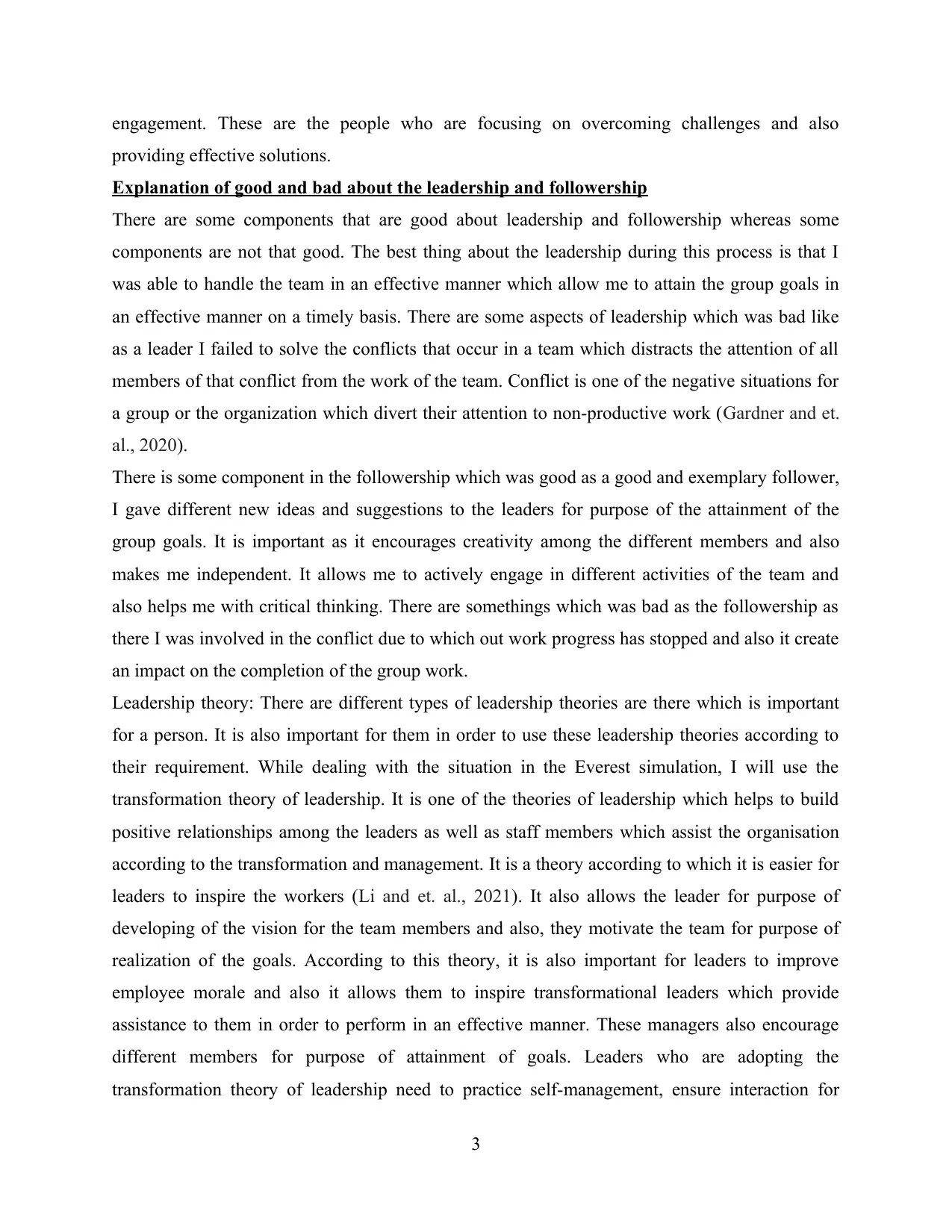
engagement. These are the people who are focusing on overcoming challenges and also
providing effective solutions.
Explanation of good and bad about the leadership and followership
There are some components that are good about leadership and followership whereas some
components are not that good. The best thing about the leadership during this process is that I
was able to handle the team in an effective manner which allow me to attain the group goals in
an effective manner on a timely basis. There are some aspects of leadership which was bad like
as a leader I failed to solve the conflicts that occur in a team which distracts the attention of all
members of that conflict from the work of the team. Conflict is one of the negative situations for
a group or the organization which divert their attention to non-productive work (Gardner and et.
al., 2020).
There is some component in the followership which was good as a good and exemplary follower,
I gave different new ideas and suggestions to the leaders for purpose of the attainment of the
group goals. It is important as it encourages creativity among the different members and also
makes me independent. It allows me to actively engage in different activities of the team and
also helps me with critical thinking. There are somethings which was bad as the followership as
there I was involved in the conflict due to which out work progress has stopped and also it create
an impact on the completion of the group work.
Leadership theory: There are different types of leadership theories are there which is important
for a person. It is also important for them in order to use these leadership theories according to
their requirement. While dealing with the situation in the Everest simulation, I will use the
transformation theory of leadership. It is one of the theories of leadership which helps to build
positive relationships among the leaders as well as staff members which assist the organisation
according to the transformation and management. It is a theory according to which it is easier for
leaders to inspire the workers (Li and et. al., 2021). It also allows the leader for purpose of
developing of the vision for the team members and also, they motivate the team for purpose of
realization of the goals. According to this theory, it is also important for leaders to improve
employee morale and also it allows them to inspire transformational leaders which provide
assistance to them in order to perform in an effective manner. These managers also encourage
different members for purpose of attainment of goals. Leaders who are adopting the
transformation theory of leadership need to practice self-management, ensure interaction for
3
providing effective solutions.
Explanation of good and bad about the leadership and followership
There are some components that are good about leadership and followership whereas some
components are not that good. The best thing about the leadership during this process is that I
was able to handle the team in an effective manner which allow me to attain the group goals in
an effective manner on a timely basis. There are some aspects of leadership which was bad like
as a leader I failed to solve the conflicts that occur in a team which distracts the attention of all
members of that conflict from the work of the team. Conflict is one of the negative situations for
a group or the organization which divert their attention to non-productive work (Gardner and et.
al., 2020).
There is some component in the followership which was good as a good and exemplary follower,
I gave different new ideas and suggestions to the leaders for purpose of the attainment of the
group goals. It is important as it encourages creativity among the different members and also
makes me independent. It allows me to actively engage in different activities of the team and
also helps me with critical thinking. There are somethings which was bad as the followership as
there I was involved in the conflict due to which out work progress has stopped and also it create
an impact on the completion of the group work.
Leadership theory: There are different types of leadership theories are there which is important
for a person. It is also important for them in order to use these leadership theories according to
their requirement. While dealing with the situation in the Everest simulation, I will use the
transformation theory of leadership. It is one of the theories of leadership which helps to build
positive relationships among the leaders as well as staff members which assist the organisation
according to the transformation and management. It is a theory according to which it is easier for
leaders to inspire the workers (Li and et. al., 2021). It also allows the leader for purpose of
developing of the vision for the team members and also, they motivate the team for purpose of
realization of the goals. According to this theory, it is also important for leaders to improve
employee morale and also it allows them to inspire transformational leaders which provide
assistance to them in order to perform in an effective manner. These managers also encourage
different members for purpose of attainment of goals. Leaders who are adopting the
transformation theory of leadership need to practice self-management, ensure interaction for
3
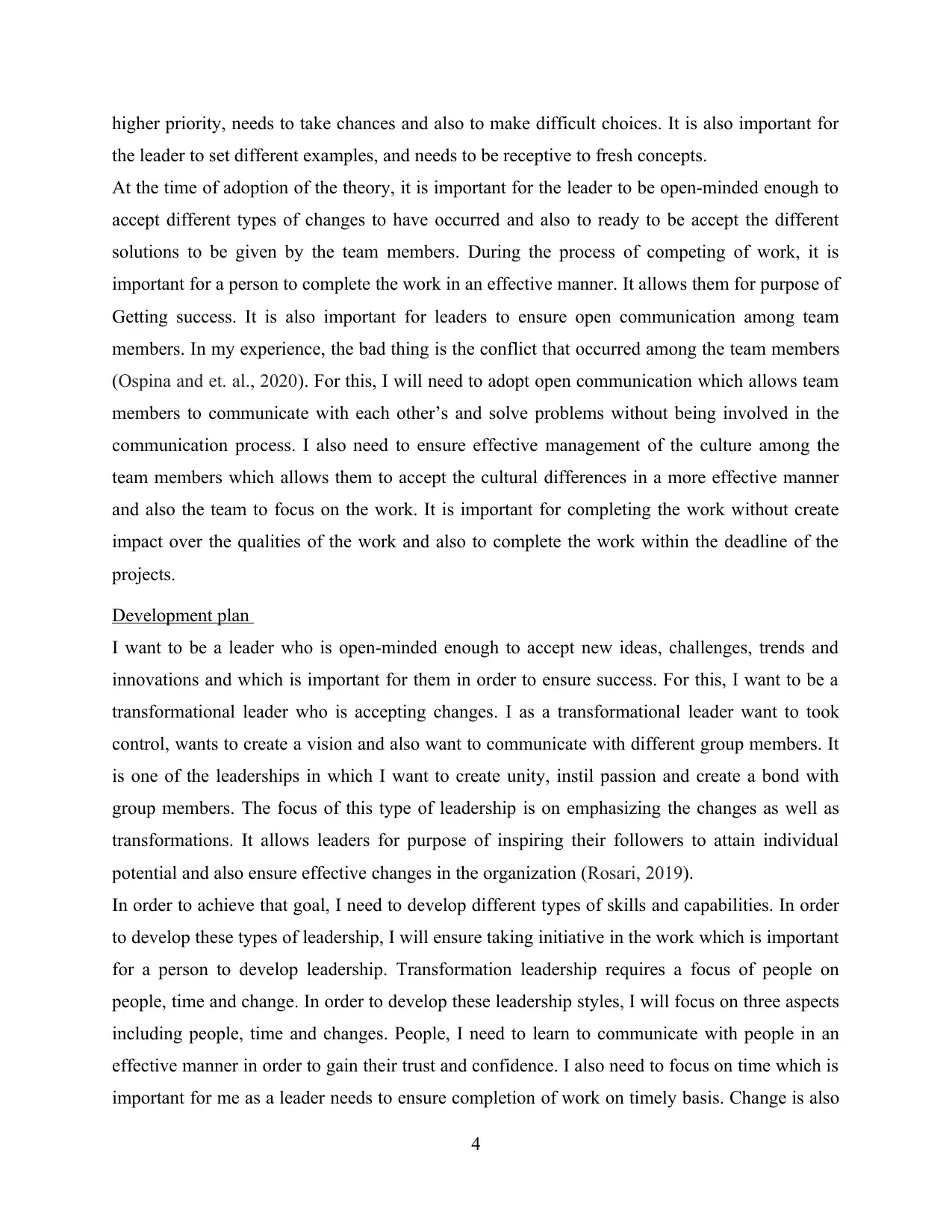
higher priority, needs to take chances and also to make difficult choices. It is also important for
the leader to set different examples, and needs to be receptive to fresh concepts.
At the time of adoption of the theory, it is important for the leader to be open-minded enough to
accept different types of changes to have occurred and also to ready to be accept the different
solutions to be given by the team members. During the process of competing of work, it is
important for a person to complete the work in an effective manner. It allows them for purpose of
Getting success. It is also important for leaders to ensure open communication among team
members. In my experience, the bad thing is the conflict that occurred among the team members
(Ospina and et. al., 2020). For this, I will need to adopt open communication which allows team
members to communicate with each other’s and solve problems without being involved in the
communication process. I also need to ensure effective management of the culture among the
team members which allows them to accept the cultural differences in a more effective manner
and also the team to focus on the work. It is important for completing the work without create
impact over the qualities of the work and also to complete the work within the deadline of the
projects.
Development plan
I want to be a leader who is open-minded enough to accept new ideas, challenges, trends and
innovations and which is important for them in order to ensure success. For this, I want to be a
transformational leader who is accepting changes. I as a transformational leader want to took
control, wants to create a vision and also want to communicate with different group members. It
is one of the leaderships in which I want to create unity, instil passion and create a bond with
group members. The focus of this type of leadership is on emphasizing the changes as well as
transformations. It allows leaders for purpose of inspiring their followers to attain individual
potential and also ensure effective changes in the organization (Rosari, 2019).
In order to achieve that goal, I need to develop different types of skills and capabilities. In order
to develop these types of leadership, I will ensure taking initiative in the work which is important
for a person to develop leadership. Transformation leadership requires a focus of people on
people, time and change. In order to develop these leadership styles, I will focus on three aspects
including people, time and changes. People, I need to learn to communicate with people in an
effective manner in order to gain their trust and confidence. I also need to focus on time which is
important for me as a leader needs to ensure completion of work on timely basis. Change is also
4
the leader to set different examples, and needs to be receptive to fresh concepts.
At the time of adoption of the theory, it is important for the leader to be open-minded enough to
accept different types of changes to have occurred and also to ready to be accept the different
solutions to be given by the team members. During the process of competing of work, it is
important for a person to complete the work in an effective manner. It allows them for purpose of
Getting success. It is also important for leaders to ensure open communication among team
members. In my experience, the bad thing is the conflict that occurred among the team members
(Ospina and et. al., 2020). For this, I will need to adopt open communication which allows team
members to communicate with each other’s and solve problems without being involved in the
communication process. I also need to ensure effective management of the culture among the
team members which allows them to accept the cultural differences in a more effective manner
and also the team to focus on the work. It is important for completing the work without create
impact over the qualities of the work and also to complete the work within the deadline of the
projects.
Development plan
I want to be a leader who is open-minded enough to accept new ideas, challenges, trends and
innovations and which is important for them in order to ensure success. For this, I want to be a
transformational leader who is accepting changes. I as a transformational leader want to took
control, wants to create a vision and also want to communicate with different group members. It
is one of the leaderships in which I want to create unity, instil passion and create a bond with
group members. The focus of this type of leadership is on emphasizing the changes as well as
transformations. It allows leaders for purpose of inspiring their followers to attain individual
potential and also ensure effective changes in the organization (Rosari, 2019).
In order to achieve that goal, I need to develop different types of skills and capabilities. In order
to develop these types of leadership, I will ensure taking initiative in the work which is important
for a person to develop leadership. Transformation leadership requires a focus of people on
people, time and change. In order to develop these leadership styles, I will focus on three aspects
including people, time and changes. People, I need to learn to communicate with people in an
effective manner in order to gain their trust and confidence. I also need to focus on time which is
important for me as a leader needs to ensure completion of work on timely basis. Change is also
4
⊘ This is a preview!⊘
Do you want full access?
Subscribe today to unlock all pages.

Trusted by 1+ million students worldwide
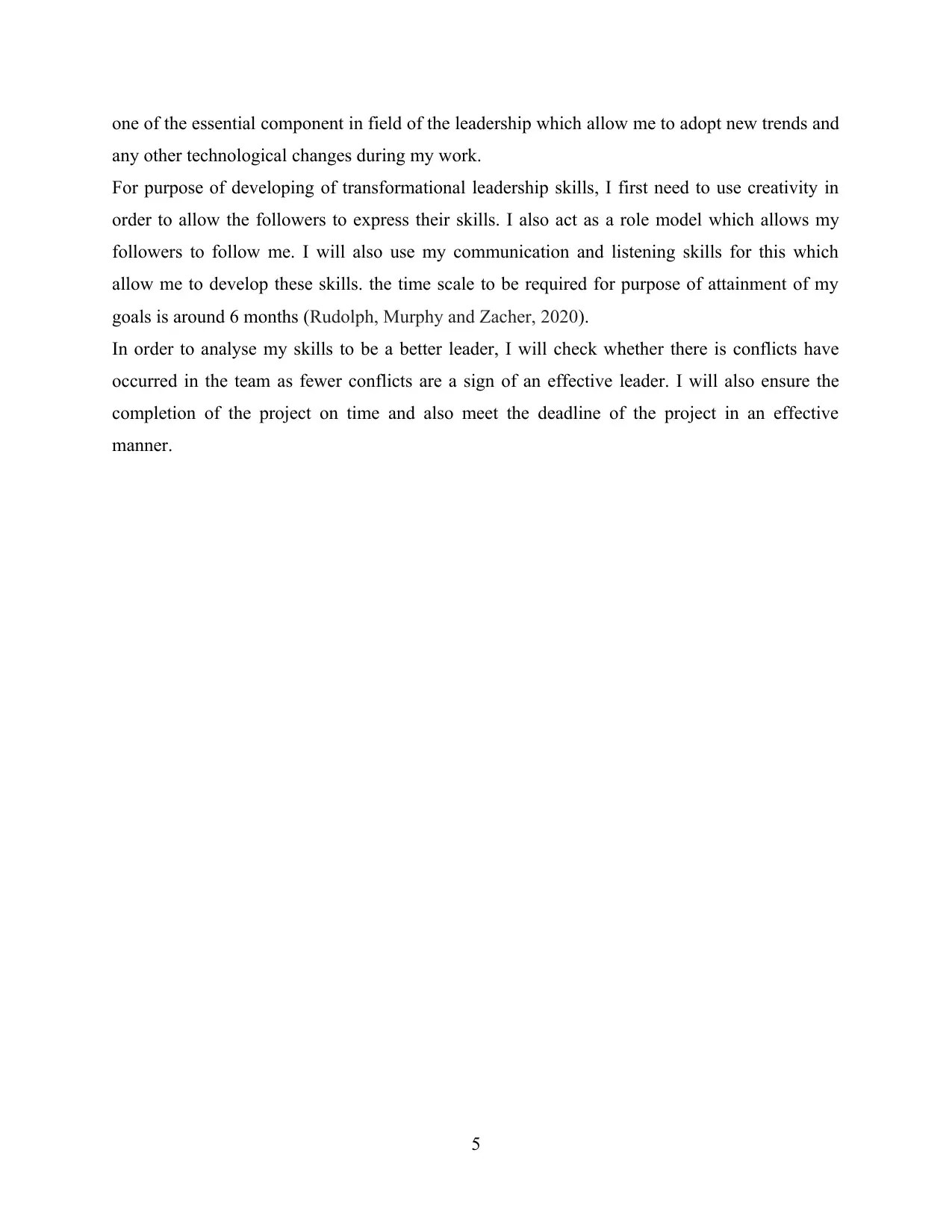
one of the essential component in field of the leadership which allow me to adopt new trends and
any other technological changes during my work.
For purpose of developing of transformational leadership skills, I first need to use creativity in
order to allow the followers to express their skills. I also act as a role model which allows my
followers to follow me. I will also use my communication and listening skills for this which
allow me to develop these skills. the time scale to be required for purpose of attainment of my
goals is around 6 months (Rudolph, Murphy and Zacher, 2020).
In order to analyse my skills to be a better leader, I will check whether there is conflicts have
occurred in the team as fewer conflicts are a sign of an effective leader. I will also ensure the
completion of the project on time and also meet the deadline of the project in an effective
manner.
5
any other technological changes during my work.
For purpose of developing of transformational leadership skills, I first need to use creativity in
order to allow the followers to express their skills. I also act as a role model which allows my
followers to follow me. I will also use my communication and listening skills for this which
allow me to develop these skills. the time scale to be required for purpose of attainment of my
goals is around 6 months (Rudolph, Murphy and Zacher, 2020).
In order to analyse my skills to be a better leader, I will check whether there is conflicts have
occurred in the team as fewer conflicts are a sign of an effective leader. I will also ensure the
completion of the project on time and also meet the deadline of the project in an effective
manner.
5
Paraphrase This Document
Need a fresh take? Get an instant paraphrase of this document with our AI Paraphraser
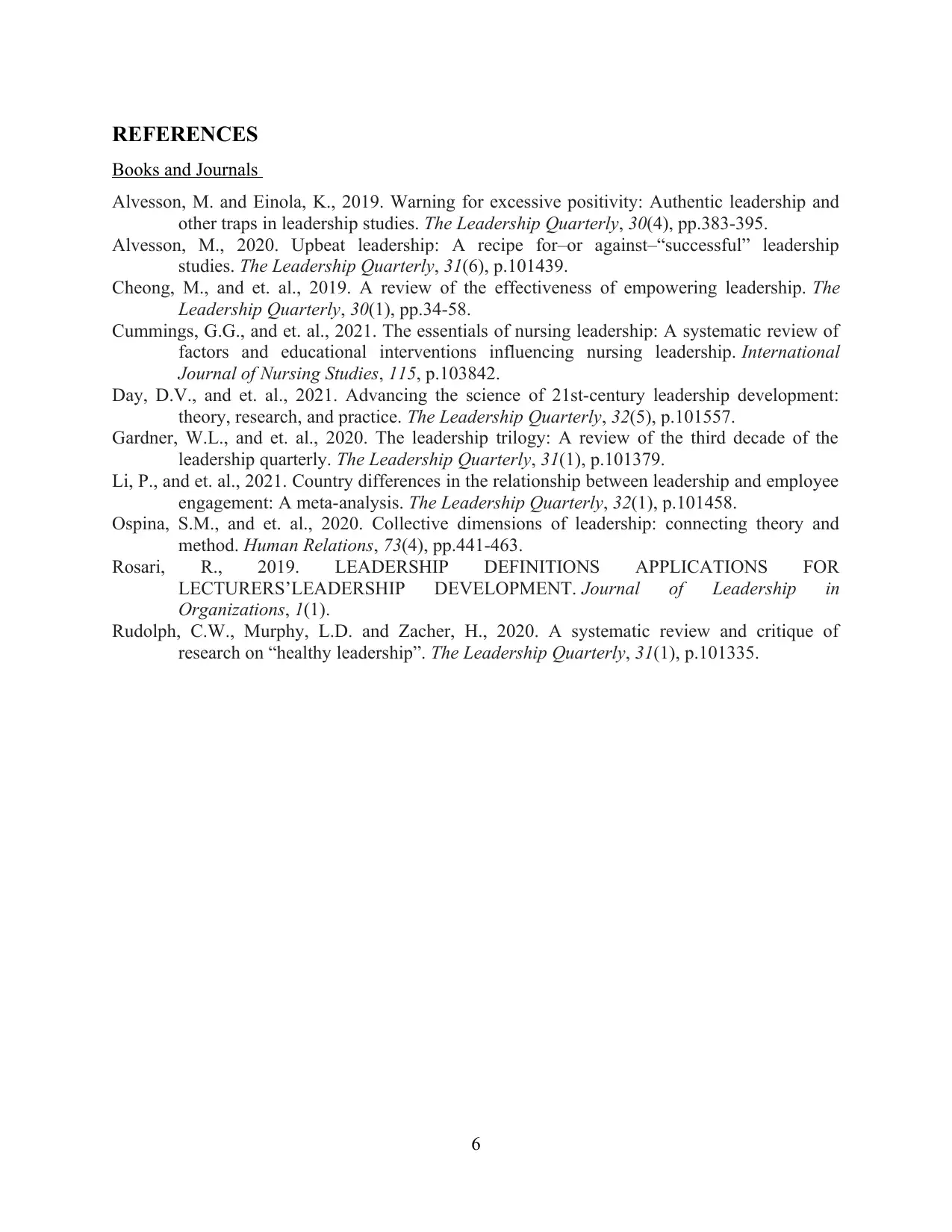
REFERENCES
Books and Journals
Alvesson, M. and Einola, K., 2019. Warning for excessive positivity: Authentic leadership and
other traps in leadership studies. The Leadership Quarterly, 30(4), pp.383-395.
Alvesson, M., 2020. Upbeat leadership: A recipe for–or against–“successful” leadership
studies. The Leadership Quarterly, 31(6), p.101439.
Cheong, M., and et. al., 2019. A review of the effectiveness of empowering leadership. The
Leadership Quarterly, 30(1), pp.34-58.
Cummings, G.G., and et. al., 2021. The essentials of nursing leadership: A systematic review of
factors and educational interventions influencing nursing leadership. International
Journal of Nursing Studies, 115, p.103842.
Day, D.V., and et. al., 2021. Advancing the science of 21st-century leadership development:
theory, research, and practice. The Leadership Quarterly, 32(5), p.101557.
Gardner, W.L., and et. al., 2020. The leadership trilogy: A review of the third decade of the
leadership quarterly. The Leadership Quarterly, 31(1), p.101379.
Li, P., and et. al., 2021. Country differences in the relationship between leadership and employee
engagement: A meta-analysis. The Leadership Quarterly, 32(1), p.101458.
Ospina, S.M., and et. al., 2020. Collective dimensions of leadership: connecting theory and
method. Human Relations, 73(4), pp.441-463.
Rosari, R., 2019. LEADERSHIP DEFINITIONS APPLICATIONS FOR
LECTURERS’LEADERSHIP DEVELOPMENT. Journal of Leadership in
Organizations, 1(1).
Rudolph, C.W., Murphy, L.D. and Zacher, H., 2020. A systematic review and critique of
research on “healthy leadership”. The Leadership Quarterly, 31(1), p.101335.
6
Books and Journals
Alvesson, M. and Einola, K., 2019. Warning for excessive positivity: Authentic leadership and
other traps in leadership studies. The Leadership Quarterly, 30(4), pp.383-395.
Alvesson, M., 2020. Upbeat leadership: A recipe for–or against–“successful” leadership
studies. The Leadership Quarterly, 31(6), p.101439.
Cheong, M., and et. al., 2019. A review of the effectiveness of empowering leadership. The
Leadership Quarterly, 30(1), pp.34-58.
Cummings, G.G., and et. al., 2021. The essentials of nursing leadership: A systematic review of
factors and educational interventions influencing nursing leadership. International
Journal of Nursing Studies, 115, p.103842.
Day, D.V., and et. al., 2021. Advancing the science of 21st-century leadership development:
theory, research, and practice. The Leadership Quarterly, 32(5), p.101557.
Gardner, W.L., and et. al., 2020. The leadership trilogy: A review of the third decade of the
leadership quarterly. The Leadership Quarterly, 31(1), p.101379.
Li, P., and et. al., 2021. Country differences in the relationship between leadership and employee
engagement: A meta-analysis. The Leadership Quarterly, 32(1), p.101458.
Ospina, S.M., and et. al., 2020. Collective dimensions of leadership: connecting theory and
method. Human Relations, 73(4), pp.441-463.
Rosari, R., 2019. LEADERSHIP DEFINITIONS APPLICATIONS FOR
LECTURERS’LEADERSHIP DEVELOPMENT. Journal of Leadership in
Organizations, 1(1).
Rudolph, C.W., Murphy, L.D. and Zacher, H., 2020. A systematic review and critique of
research on “healthy leadership”. The Leadership Quarterly, 31(1), p.101335.
6
1 out of 8
Related Documents
Your All-in-One AI-Powered Toolkit for Academic Success.
+13062052269
info@desklib.com
Available 24*7 on WhatsApp / Email
![[object Object]](/_next/static/media/star-bottom.7253800d.svg)
Unlock your academic potential
Copyright © 2020–2026 A2Z Services. All Rights Reserved. Developed and managed by ZUCOL.





